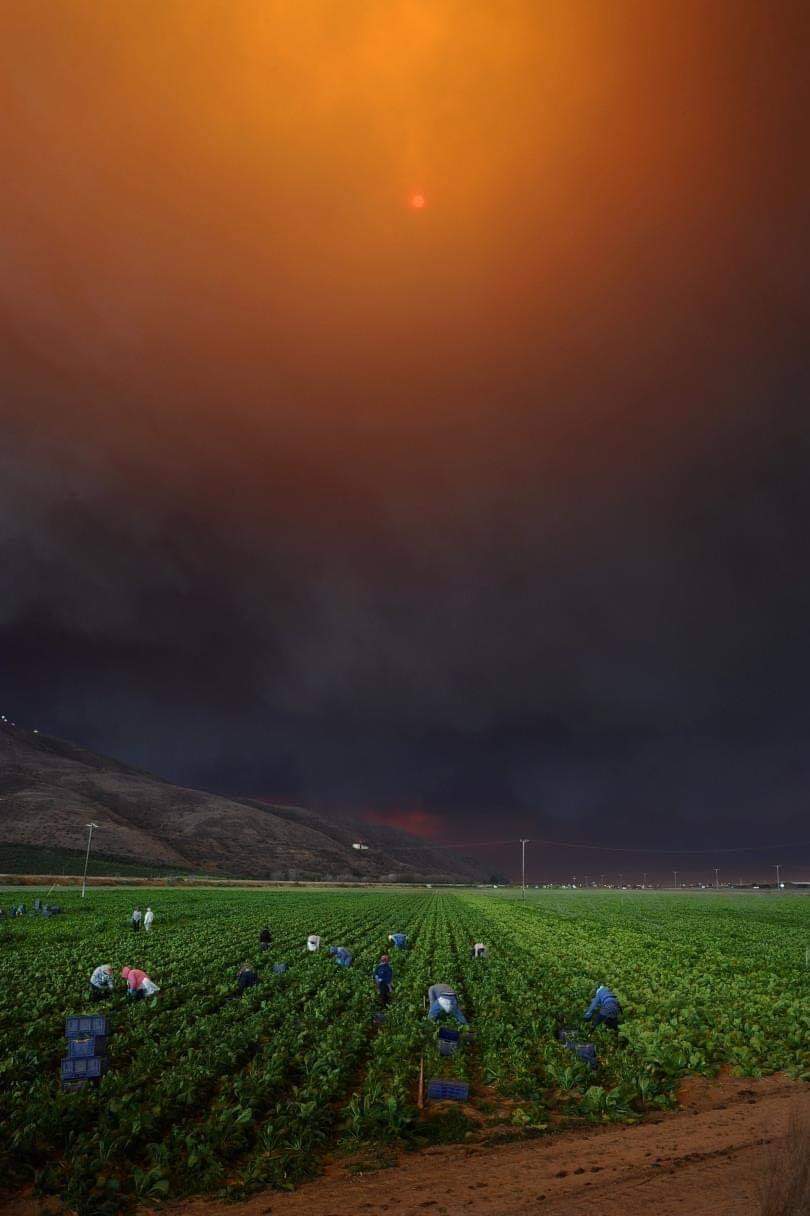Farm to Fork Column
By: Victor Martino
 Fire, Water, and Farming in the Golden State
Fire, Water, and Farming in the Golden State
As I write this column Friday, Nov. 16, the Golden State is on fire, from upscale Malibu in the south to rural Butte County in the north.
According to various governmental agencies, California has the worse air-quality in the world this week; even worse than China and India.
Two catastrophic fires — the Woolsey Fire in Southern California and the Camp Fire in the north — have created a dystopian scene in California as dark clouds of smoke hang in the air and people walk around our cities and rural communities wearing face masks.
Schools are closed, and our friends and neighbors in the north and the south are suddenly without homes.
As of today 1,300 people remain missing from both fires. The death toll from the Camp Fire stands at 76. A total of 3 fatalities have been confirmed to date in the Woolsey Fire.
The Camp Fire has thus far destroyed 148,00 acres of land. The Woolsey fire has claimed 98,362 acres, according to state authorities.
Amidst this horrendous devastation and sadness, farming goes on in the Golden State, the leading food producing region in the world.
For example, on Wednesday Nov. 14 the farm workers pictured above continued to harvest crops in a field in Camarillo not far from the Woolsey fire despite the umbrella of heavy smoke overhead. When it’s time to harvest, farm workers in California do their job, putting food on the table for the rest of us — and the world.
Some farms in the Camarillo area and in Oxnard where the Hill Fire (yet a third blaze) also burned, have actually increased production because they wanted to harvest before the ash from the fires damaged the crops. Farm workers wore face masks while they picked the crops, the sky overhead blackened by smoke.
Other farmers gave workers time off for health and safety reasons. But the reality is if farm workers don’t work, they don’t get paid. Most have continued working throughout the fires.
The fires also have destroyed farmland and displaced farm animals and livestock. An assessment of just how much damage the fires have done to farmland is pending.
The fires come at a time when another of nature’s forces, water, is on the mind of every farmer in the Golden State.
On Nov. 9 the State Water Resources Control Board postponed a decision on the Bay-Delta Plan update for the lower San Joaquin River and Southern Delta following a written request from Gov. Jerry Brown and Gov.-Elect Gavin Newsom.
Brown and Newsom urged the board to grant a short extension to allow progress on negotiations between the various interested parties, including farm groups, toward voluntary agreements.
That decision will have a significant impact on agriculture in the Central Valley, the state’s leading farm region, as it will help guide and determine how much water is allocated to farmers.
The State Water Resources board says it plans to make its decision this month.
Outgoing Governor Jerry Brown is trying to negotiate a grand water bargain that would result in less harm to agriculture while at the same time satisfying the demands of the various competing interests. It’s not an easy task to accomplish in California.
Fires and farmers both need water.
But thus far it’s been a dry winter in the Golden State, a situation that compounds things today – rain will help speed up the containment of the fires – and tomorrow – another dry winter is the last thing farmers need, particularly if their current water allocations are reduced.
Nature is determining how 2018 ends in California — fire and water.
California’s farmers have tamed nature and work in harmony with it to produce more food and fiber than do farmers in any other place in the world.
It’s their bounty that’s keeping the brave firefighters sustained as they work around the clock to extinguish fires on both ends of the state, for example.
These two themes, fire and water, will be at the forefront for Californians as we enter 2019 in January.
The toll of the fires, human and financial, will be huge.
The decision by the State Water Resources Control Board this month also will be huge — for farmers and for agriculture in the Golden State.
Noted journalist, lawyer and historian Carey McWilliams called California “The Great Exception” in his famous 1949 book of the same name.
In the book, McWilliams stepped back to access the state at the end of its first 100 years. As he examined the reasons for the prodigious growth and productivity that characterized California since the Gold Rush (and to this day it turns out), he praised the vitality of the new citizens who had come from all over the world to populate the state in a very short time.
He also described, and he was prescient about this, the need for migrant labor to facilitate and grow the state’s massive agricultural industry.
McWilliams also discussed California water politics and natural disasters — fire and water — as forces that have played a role in shaping the Golden State.
All the observations made by McWilliams about California in that 1949 book hold true today.
The founders of Google and Apple Computer Company, for example, are immigrants, as are many other founders and leaders of cutting-edge companies in Silicon Valley.
Migrant farm labor remains essential to facilitate the Golden State’s huge agriculture industry. In fact, the current scarcity of labor has the potential to cripple farming in California.
And nature — fire and water — have the potential to determine much of our fate here in California at any time.
Farmers are among those seriously impacted by the horrendous fires. Most will rebuild as they always do. But like the other victims of the fires they could use a helping hand.
Let’s end 2018 helping our neighbors in need, from the north to the south. Merry Christmas to all. And to the Golden State.
How to help farmers and other victims of the California fires
As a way to assist farms, ranches and rural communities hurt by the wildfires, the California Farm Bureau Federation (CFBF) has established a Farm and Rural Disaster Fund.Created under the California Bountiful Foundation — a charitable foundation established by CFBF — the fund is collecting monetary contributions to aid communities affected by natural disasters. “All too often, we’ve seen rural areas of California wracked by fires, floods and other natural disasters,” CFBF President Jamie Johansson says.
Therefore, “We’ve created the Farm and Rural Disaster Fund in response to our members’ request to be able to provide aid to farms, ranches and rural communities that have suffered losses.”
Contributions to the fund may be made online via the CFBF website at www.cfbf.com or the California Bountiful website at www.californiabountiful.com.
If you prefer to donate by postal mail you can send a check, payable to California Bountiful Foundation, to California Bountiful Foundation; Farm and Rural Disaster Fund; 2300 River Plaza Drive; Sacramento, CA 95833; Attn: Financial Services.

By Victor Martino
